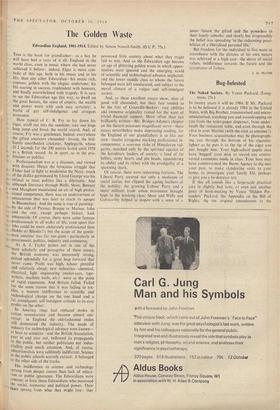The Golden Waste
Edwardian England, 1901-1914. Edited by Simon Nowell-Smith. (0.U.P., 75s.)
t THIS is the book for grandfather: as a boy he Will have had a taste of it all. England in the world class, even in music where she had never achieved it before: indeed, Elgar is more sym-
- bolic of this age, both in his music and in his
1 life, than any other Edwardian—his music rich, , copious, golden with the elegiac undertone; his 1, life soaring in success, resplendent with honours, I and finally overwhelmed with tragedy. It is easy
!, to see the Edwardian age this way, to dwell on the great houses, the sense of empire, the wealth and power worn with such easy certainty; a world of gay self-indulgence and arrogant assurance.
How typical of C. B. Fry to lay down his cigar, stroll out into the sunshine, take one huge long jump and break the world record. And, of course, Fry was a gentleman. Indeed, everywhere the gifted amateurs abounded—Jessop, the bril- liantly unorthodox cricketer, Applegarth, whose 21.2 seconds for the 200 metres lasted until 1958 as a British record. As in sport, so in the pro- le. fessions or politics.
Professionalism was at a discount, and viewed With disquiet. Hence the ferocious struggle that Fisher had to fight to modernise the Navy; much h of the dislike germinated by Lloyd George was his . refusal to treat politics like a dilettante. And
br) although literature through Wells, Shaw, Bennett and Maugham maintained an air of high profes- sional competence, there was an undercurrent of amateurism that was later to reach its apogee in Bloomsbury. And the same is true of painting: ,f1+ by the side of Picasso, Braque or Matisse, John and the rest, except perhaps Sickert, look amateurish. Of course, there were some famous
I professionals in all walks of life, even sport (for Who could be more obdurately professional than Hobbs or Rhodes?), but the scope of the gentle- ' man amateur was far too great—particularly in ‘'-ttli government, politics, industry and commerce. As A J. Taylor points out in one or the most scholarly and perceptive of these essays, the British economy was immensely strong, Poised splendidly for a great leap forward that never came. Profit was high, labour plentiful and relatively cheap; new industries—chemical, electrical; light engineering (motor-cars, type- writers, machine tools, etc.)—were at the point of rapid expansion. And Britain failed. Failed for the same reason that it was failing in tex- tiles, a wanton indifference to scientific and technological 'change on the one hand and a fat, comp4cent, self-indulgent attitude to its easy Profits on the other.
In America rings had replaced mules in cotton manufacture and become almost uni- versal: in England the old-fashioned mules still dominated the industry. The needs of industry for technological advance were known— at least to scientists—and the British Association, Year in and year out, bellowed its propaganda to the public, but neither politicians nor indus- trialists paid much attention. And, of course, educationalists were sublimely indifferent. Science in the public schools scarcely existed: it belonged to the other side of the tracks.
The indifference to science and technology "Prang from deeper causes than lack of educa- tion or public ignorance. The Edwardians were Content; at least those Edwardians who possessed the social, economic and political power. Their fears sprang from what they might lose: they possessed little anxiety about what they might fail to win. And so the Edwardian age became an age of glittering golden waste in which oppor- tunities were ignored and the emerging world of scientific and technological advance neglected; and the lower middle class to whom the future belonged were left uneducated, and subject to the moral climate of a vulgar and self-indulgent society.
And, as these excellent essays show, men of good will abounded; but their fate tended to be the fate of Granville-Barker: vast abilities and immense originality ruined for the want of trivial financial support. More often than not brilliantly written—Mr. Bridges-Adams's chapter on the theatre possesses magnificent verve—these essays nevertheless make depressing reading, for the England of our grandfathers is so like our own—insular arrogance masking professional in- competence; a nouveau riche of Himalayan vul- garity, matched only by the spiritual squalor of the hereditary leaders of society; a land of fat bellies, stony hearts and pin heads, squandering its ability and its riches with the prodigality of a spawning shark.
Of course, there were redeeming features. The Liberal Party secured not only a modicum of social justice, but clipped the ageing feathers of the nobility; the growing Labour Party and a more militant trade union movement brought hope to the working class; Shaw and Wells and Galsworthy helped to inspire with a sense of a juster future the gifted and the powerless in their lonely suburbs; and slowly but irrepressibly the belief was spreading 'in the redeeming possi- bilities of a liberalised personal life.'
But freedom for the individual to live more in accordance with the dictates of his own nature was achieved at a high cost—the decay of social values, indifference towards the future and the acceptance of failure.
3. FL PLUMB


































 Previous page
Previous page